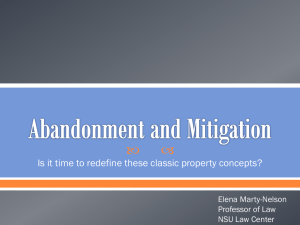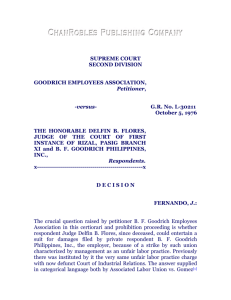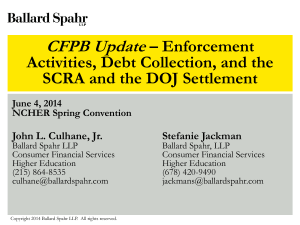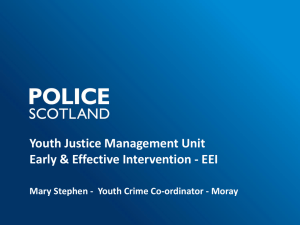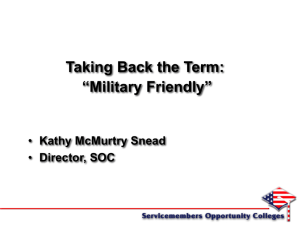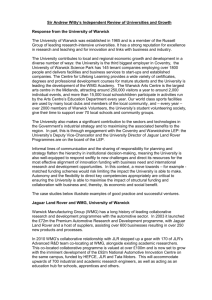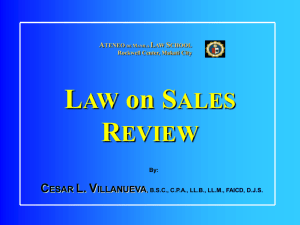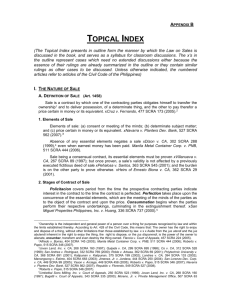The Soldiers` and Sailors` Civil Relief Act
advertisement
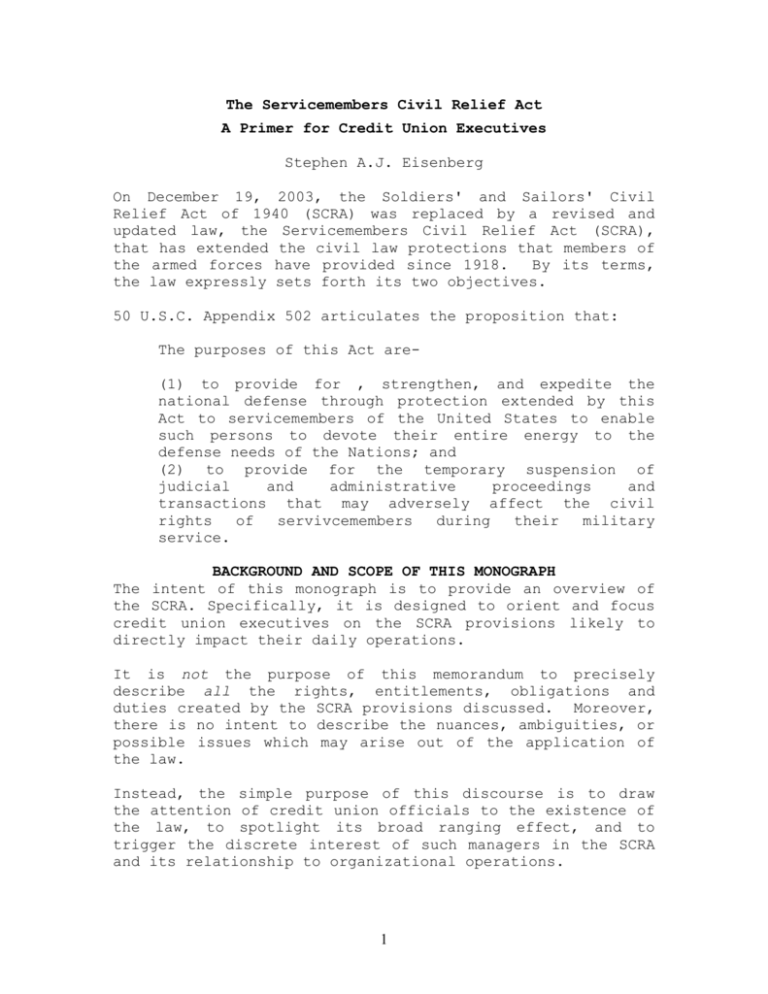
The Servicemembers Civil Relief Act A Primer for Credit Union Executives Stephen A.J. Eisenberg On December 19, 2003, the Soldiers' and Sailors' Civil Relief Act of 1940 (SCRA) was replaced by a revised and updated law, the Servicemembers Civil Relief Act (SCRA), that has extended the civil law protections that members of the armed forces have provided since 1918. By its terms, the law expressly sets forth its two objectives. 50 U.S.C. Appendix 502 articulates the proposition that: The purposes of this Act are(1) to provide for , strengthen, and expedite the national defense through protection extended by this Act to servicemembers of the United States to enable such persons to devote their entire energy to the defense needs of the Nations; and (2) to provide for the temporary suspension of judicial and administrative proceedings and transactions that may adversely affect the civil rights of servivcemembers during their military service. BACKGROUND AND SCOPE OF THIS MONOGRAPH The intent of this monograph is to provide an overview of the SCRA. Specifically, it is designed to orient and focus credit union executives on the SCRA provisions likely to directly impact their daily operations. It is not the purpose of this memorandum to precisely describe all the rights, entitlements, obligations and duties created by the SCRA provisions discussed. Moreover, there is no intent to describe the nuances, ambiguities, or possible issues which may arise out of the application of the law. Instead, the simple purpose of this discourse is to draw the attention of credit union officials to the existence of the law, to spotlight its broad ranging effect, and to trigger the discrete interest of such managers in the SCRA and its relationship to organizational operations. 1 OVERVIEW The SCRA is divided into seven parts, each being characterized as an "article." Each article deals with a single, broad subject area. The elements are thereafter subdivided into individual sections which address specific concerns. This monograph will briefly describe the contents of 17 sections that affect credit unions directly. Importantly, it should be noted that Title IV of the SCRA deals with issues pertaining to insurance. Although no review of its sections has been undertaken, depending on the activities of a particular credit union or a credit union service organization, the coverage of these provisions may be of equal importance to an institution. This monograph should not be viewed as a substitute for reading and studying the SCRA itself. In this connection, it is critical to recognize that there are no regulations promulgated by any governmental entity which explain or amplify the SCRA. SCRA ENVIRONMENTAL BACKGROUND Why has the SCRA, a law which has been in effect for well approaching a century, become even more important and critical to understand? The answer lies in the change from the even-keeled manner in which America's armed forces were maintained and called upon since the conclusion of involvement in Vietnam. During this period, the United States relied on a volunteer force that periodically was called to combat services. Starting with military events of 1990 in Kuwait that brought about the sudden deployment and mobilization of tens of thousands of individuals, including members of the reserve components, and continuing after September 11, 2001, the operational dynamic of America’s military warriors has made their ability to deal with their civil legal matters extraordinarily difficult. It is this latter group of individuals, servicemembers with an established lifestyle based on civilian income levels that are subject to being sharply diminished by military service, who are suddenly being brought within the law's protections. And they are claiming it. 2 Notably, the underlying rights which the SCRA protects have been recognized by the federal government as far back as the Civil War. In that era, jurisdictions on both sides of the conflict passed legislation which absolutely prohibited the institution of civil litigation against members of the respective armed forces. The precursor to the SCRA was enacted by Congress in 1918. Thereafter, in 1940, the law was replaced with legislation, which was substantially similar. That statute, with the exception of minor modification, has remained a viable law until 2003. Whether an individual enters active duty with the armed forces voluntarily or through conscription, the law seeks to provide individuals with peace of mind in two respects. First, the statute neutralizes the significant disadvantages a person is faced with in seeking to defend a civil lawsuit during the period of such military service. It recognizes that individuals serving in the armed forces may be stationed anywhere in the world, as well as be subject to the vicissitudes of a disciplined and altered lifestyle, including limitations on when and where they can travel. Second, the legislation serves to place individuals in a status quo position with respect to their liabilities or obligations during service in the armed forces. In this way, the statute prevents service members from being adversely affected by the change from civilian to military life. The law's framers recognized that individuals may have incurred debts in accordance with a degree of income commensurate with civilian endeavors, and that their income may have decreased as a function of military service. In short, the legislation attempts to ensure that individuals serving their nation will do so with the assurance that such service will not be to their financial detriment. It seeks to balance national interests with those of debtors and creditors. The protections afforded by the SCRA, up until military actions of 1990 in the Middle East, have minimally affected creditors. The reason is simple. 3 Two out of three classes of borrowers to whom the law potentially applied had not triggered the application of the SCRA's provisions in their favor to any significant degree. For example, younger persons first coming into the armed forces, regardless of whether they were enlisted members or officers, did not have the extensive monetary obligations of older individuals. Generally, they had a limited number of obligations which are protected under the SCRA. On the other side of the spectrum were those servicemembers who had been in military service for a period of time and had acquired pecuniary obligations while in service. These liabilities for the most part do not have the protection of the SCRA. The circumstances of the third group, reservists and members of the national guard, squarely represent the most critical population the SCRA aims to resolve. Individuals who fall into the latter category have established civilian lifestyles and standards of living while at the same time have maintained a military status. Having been called to active duty, the lifestyle they have created is compromised by an immediate and marked change in income. Invariably, entering active military duty involves a precipitous drop in earning capability which in turn precludes the newly activated servicemember from meeting previous obligations. If a warrior's debts are not satisfied, reservists would be exposed to legal action for failure to pay their debts. Hence, the SCRA is designed to serve as the platform enabling individuals to ‘freeze’ their legal status until they return to the circumstance where they are able to meet their pecuniary responsibilities once again. A singular equitable principle runs throughout the SCRA. It is the concept of whether individuals who seek protection of the statute have had their rights or interests "materially affected" as a result of military service. Throughout the provisions of the law, judicial decisions may be made only after an evaluation of this issue. Indeed, this “fairness” standard is attendant to questions of both whether a civil proceeding against a servicemember should be stayed and if an individual in the armed forces should 4 be entitled to limit the execution of any judgment on such obligations or liabilities. STATE LAW Importantly, the Federal Credit Union Act (FCA) does not preempt state laws related to servicemember protections. Notwithstanding the implications of the SCRA, it is critical that credit union managers consider whether there is a complementary state law that also may afford servicemembers civil legal protections. Various states have legislated additional protections for servicemember residents who have been called to active duty. And these statutes provide rights and benefits that may well be more extensive then those provided by the SCRA. SCRA PROVISIONS As indicated, the key purpose of this discourse is to direct the attention of credit union officials to key SCRA sections they are likely to be confronted with requiring further detailed consideration. Described below are the section(s) numbers from 50 United States Code Appendix, the corresponding title of the section, and a brief synopsis of the content of the provision. Critically, the only authorities available for obtaining a further understanding of the law's meaning are judicial decisions and professional articles dealing with its provisions. Accordingly, because of the limited number of resources available for applying and interpreting the law, as well as their professional nature, any questions which arise should be referred to legal counsel for consideration and advice. 511. Definitions. This provision establishes the basic terminology which is used throughout the SCRA and the meaning associated with terms used within the law. It is very important as it provides, among other concepts, the exact forms of national service which are considered to be "military service." Thus, beyond traditionally accepted notions, are also included service in the Coast Guard and, in certain situations, service as an officer of the Public Health Service. The section provides that the law is only applicable to individuals who are on active service or duty. One court 5 has held that reservists not on active duty may not invoke the protections of the law. The corollary to this is that reservists called to active duty are entitled to the protection of the law. Finally, the term "court" is broadly defined. specifically means any court, federal or state, irrespective of the fact that it is one of record. It and 513. Protection of Persons Secondarily Liable. This section permits courts to protect the interests of individuals who may have liability on a debt to the same extent as one who is entitled to the protection of the SCRA. In particular, a court may stay or postpone a proceeding or vacate a judgment for a surety just as it would for the principal debtor in military service. It should be noted that courts have used various tests to determine whether to grant relief pursuant to this section to individuals who are secondarily liable on a servicemember's debt. Additionally, it is appropriate to observe that there exists no requirement for a judge to act, but the law defers to judicial discretion. 514. Extension of Protections to Citizens Serving With Allied Forces. Persons who serve with allies of the United States in the "prosecution of a war or military action" in which the United States is involved and are citizens of the United States are entitled to the protections of the SCRA. In this regard, it should be noted that there is one key phrase which requires close scrutiny before the section is applicable. It is "in the prosecution of any war or military action." 516. Extension of Rights and Protections to Reserves Ordered to Report for Military Service and to Persons Ordered to Report for Induction. This section extends the protection of the SCRA to individuals who are “ordered to report for induction under the Military Selective Service Act”, i.e. drafted--not a factor under the present military service environment of the United States--or to "a member of a reserve component who is ordered to report for military service...." Hence, a person may seek the law's protection in a limited set of circumstances of the law prior to actually coming on active duty. 6 517. Waiver of Rights Pursuant to Written Agreement. By this section, Congress expressly establishes the basis for individuals who have the protection of the SCRA to enter into the modification or termination of agreements thereby waiving their rights. Further, the provision permits debtors in military service to authorize foreclosure, repossession or sale of property. For any transaction undertaken pursuant to this section to be effective, various critical elements of the law must be fulfilled. Thus, any such agreement must be in writing; the action has to be taken during or after the "period of military service"; and, there must be a prominent display of the contractual rights waiver “in at least 12 point type.” 518. Exercise of Rights Under Act not to Affect Certain Future Financial Transactions. The law clearly prohibits a creditor from taking an adverse action against a debtor who applies under the terms of the SCRA for a stay, postponement or suspension in the payment of any obligation or liability by itself and without regard to any other consideration. In short, this is an anti-retaliation protection. The section specifically identifies a number of potential actions which are deemed to be improper. These include: determining that the person cannot pay his or her debts; with respect to a transaction, a denial or revocation of credit, changing the terms of an existing relationship, or refusing to grant credit on substantially the same grounds or in the amounts requested by the applicant; and issuing an adverse credit report. 521. Protection of Servicemembers Against Default Judgments. Before taking a default judgment against an individual, the SCRA requires that an affidavit be filed reciting specific facts "stating whether or not the defendant is in military service and showing necessary facts to support the affidavit...." A simple statement is insufficient. It is therefore important to be able to provide counsel with information to support an individual's status. This provision of the law additionally authorizes courts to appoint counsel for defendants to protect their interests. It also creates a basis by which a servicemember with a 7 meritorious or legal defense may have the court reopen the judgment which was ordered. 522. Stay Of Proceedings When Servicemember Has Notice. During the course of an action in which a servicemember is either a plaintiff or a defendant, a stay in the proceedings may be granted by the presiding judge. It is interesting to note that the nature of the underlying obligation can be one which was incurred before entering the service or during the period of service. Before authorizing a stay, it is essential for the judge to find that the person's “current military duty requirements materially affect the servicemember's ability to appear” and thus prosecute or defend the action. One further observation is appropriate. The stay may be considered on the motion of the court itself or by, or on behalf of, the person in military service. 523. Fines and Penalties Under Contracts. The ability of a creditor to assess fines and penalties pursuant to an agreement is limited by this section in two ways. First, if an action for compliance with a contract has been stayed by a court, no fine or penalty may be imposed. Second, if an individual's military service materially affected that person's capability to meet his or her legal obligations, a court may relieve the servicemember of the sanction. This section would clearly implicate the imposition of late charges. Moreover, it should be considered that the term "penalty" is not defined and may well be broadly construed to perhaps include calling a loan fully due and payable. 524. Stay or Vacation of Execution of Judgments, Attachments, and Garnishments. Although this section permits the imposition of a stay, the judicial action contemplated by the provision is not related to the conduct of a previous judicial proceeding itself but relates to the result of it, i.e., the judgment or order of the court. As with other sections of the SCRA, a judicial order is based on a finding that "the ability of the defendant to comply with the judgment or order entered or sought is not materially affected by reason of his military service." 8 527. Maximum Rate of Interest on Debts Incurred Before Military Service. An individual who is in military service and has undertaken obligations before entering such service is relieved from paying interest at a rate greater than 6 percent per year. The relief extends only during the period while the person is on active duty in the military service. The term "interest" is defined to "include service charges, renewal charges, fees, or any other charges...with respect to an obligation or liability." Critically, the protection is not automatically extended. A servicemember must take action to obtain its coverage. Specifically, the individual must provide the creditor with written notice and a copy of the military orders calling her/him to military service. Similarly, the limitation of a section may also be invoked by those who are secondarily liable on a debt under the provisions of the SCRA, 513. The section does afford a creditor an avenue for relief. A lender may apply for a judicial order to raise the statutory interest ceiling based on the fact that the obligor's military service is not materially affect his or her ability to meet terms of the contract. 532. Protection Under Installment Contracts for Purchase or Lease. By its immediate terms, this provision deals with the situation where an individual makes a deposit or installment payment on a contract for the purchase of real or personal property before coming into service and then, after entering service, does not make a payment or breaches the relationship in some other way. The SCRA prevents the person to whom the obligation is due from affecting the rights of the servicemember, even under the terms of the contract, except through court action. Observe that the section also applies to a "lease or bailment” of such property. Thus, it could apply in the case of an auto that contains a purchase option at the conclusion of the term. A vendor is only permitted to act after seeking the action of a court “of competent jurisdiction.” The law provides courts acting pursuant to this provision with broad authority to deal with the issues presented to them. One 9 facet of the court's analysis is the question of whether the military service has impeded the serviceperson's ability to meet the obligation. The law also has two additional legal components. The first is that there is a criminal penalty associated with it. That is, a creditor found to have violated the law can been found guilty of a misdemeanor and sentenced to up to one year in prison. Second, the military member has the right to bring a civil action against the creditor who violates the provision and seek money damages or other civil relief. 533. Mortgages and Trust Deeds. This provision specifically deals with the question of nonpayment of mortgage debts and actions to foreclose on property securing the debts. It is applicable to situations where the following criteria are met: - The mortgage obligation is on property owned by a servicemember before he or she enters active duty; - The liability arose before entrance into military service; and, - The property is owned by the servicemember at the time the section is invoked. No action is permitted to be taken unless accomplished under a court order. The law directs judges to consider the ability of the individual to meet his or her obligations in light of military service and grants broad authority for judges to fashion relief in such circumstances. 534. Settlement of Stayed Cases Relating to Personal Property. In situations where a court has ordered a stay in proceedings to foreclose on property, repossess personal property, or terminate a purchase agreement, the court may decide in reviewing the interests of the parties concerned that it is appropriate to allow the obligee to take the action it desires. This being the case, the court is authorized to appoint three disinterested parties to appraise the property. If appropriate, upon a monetary payment to the military member or his or her dependent, the court then may allow the 10 obligee to continue on with the course of action it wishes to follow. 538. Extension of Benefits to Dependents. Article III of the SCRA may be applied to benefit the "dependents" of military members by order of a court. This hinges on a finding that the individuals seeking relief have been materially affected in meeting the obligations under consideration as a result of the military service of the person upon whom they are dependent. It should be noted that there is no definition to the term "dependent." Thus, it does not necessarily mean that there must be a legal relationship to the party in military service. By illustration, an elderly father driving a leased car with an option to purchase who is "dependent" on a "person in military service" and who cannot meet payments may come within the protection of this section. 581. Inappropriate Use of Act. Some individuals may attempt to avail themselves of the extraordinary protections afforded by the SCRA by transferring interests or property to persons who are protected by the law or will be protected by it. This section enables a court to consider this situation and preclude a person who would not otherwise have had a right to the protection of the law from obtaining protection under it. 591. Anticipatory Relief. This SCRA provision permits a servicemember to seek the protection of a court before any action is taken by the obligee or, in fact, before the servicemember has breached any obligation. Subject to a finding that the servicemember has not been materially affected by military service, the court is invested with extensive powers, including the authority to order stays of enforcement of the obligations as well as to establish repayment plans. 597a. Critically, this SCRA section provides a civil right of action to anyone who charges that another violated the SCRA, which affected the person. The section offers both an equitable remedy and a broadly stated right to “...recover all other appropriate relief, including monetary damages”, which could include both compensatory and punitive damages for violating the law. 11 Stephen A.J. Eisenberg is EVP/general counsel for billion Pentagon Federal Credit Union, Alexandria, Va. 12 $15


![[Real Estate Agent`s Letterhead]](http://s3.studylib.net/store/data/005885327_1-3dc7ad8d7e4c10c901ad78616807b37d-300x300.png)
